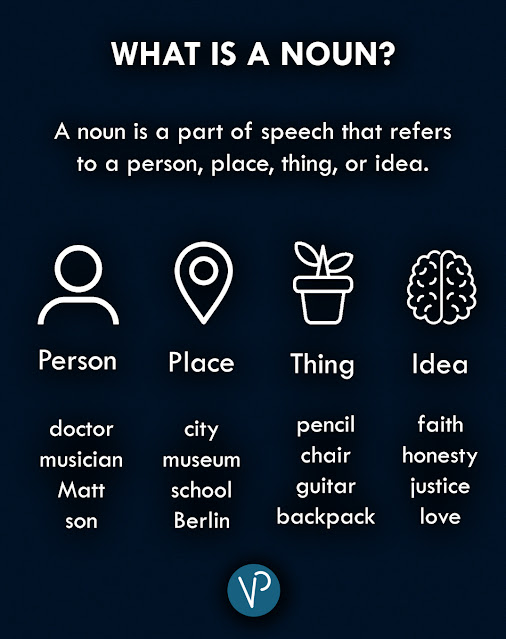名詞(noun)は、人、場所、物、または考えを指す単語 です。英語では、名詞は文章の中で重要な役割を持ち、多くの異なる種類があります。
名詞の種類と例
1. 人(person)
- 例: doctor(医者), musician(音楽家), Matt(マット), son(息子)
2. 場所(place)
- 例: city(都市), museum(博物館), school(学校), Berlin(ベルリン), France(フランス)
3. 物(thing)
- 例: pencil(鉛筆), chair(椅子), guitar(ギター), backpack(リュック)
4. 考え・概念(idea)
- 例: freedom(自由), faith(信念), honesty(正直), justice(正義), love(愛)
また、英語には 名詞と動詞の両方として使われる単語 も多くあります。例えば、"love"(愛・愛する) や "run"(走る・ランニング) など、文の中での使い方によって品詞が変わる単語もあります。
名詞の見分け方
1. 名詞の語尾
特定の語尾を持つ単語は、名詞である可能性が高いです。
- -hood → neighborhood(近所)
- -ment → development(発展)
- -ness → kindness(親切さ)
- -ance → attendance(出席)
2. 名詞の前にくる単語
名詞の前には、形容詞 や 限定詞(determiner) がつくことが多いです。限定詞とは、名詞の前に置かれ、その名詞がどのようなものかを示す単語です。
例:
- the book(その本)
- her cat(彼女の猫)
- five oranges(5つのオレンジ)
- that car(あの車)
- their house(彼らの家)
- happy child(幸せな子供)
- fast car(速い車)
- rich man(裕福な男性)
3. 複数形(Plurals)
多くの名詞は、単数形から複数形に変化することで名詞であることがわかります。英語では通常、"-s" や "-es" をつけて複数形を作ります。
例:
- dog → dogs(犬)
- chair → chairs(椅子)
- table → tables(テーブル)
- brush → brushes(ブラシ)
- hero → heroes(英雄)
ただし、英語には 不規則な複数形 もあります。
例:
- child → children(子供)
- mouse → mice(ネズミ)
- tooth → teeth(歯)
- foot → feet(足)
- deer → deer(鹿) ※単数・複数同じ
4. 文の中での役割(Grammatical functions)
名詞は、文章の中で様々な役割を果たします。
- 主語(subject): The dog barked loudly.(犬が大きな声で吠えた。)
- 目的語(object): The boy kicked the ball.(少年がボールを蹴った。)
- 所有格(possessive): John's car is red.(ジョンの車は赤い。)
ただし、文章の主語や目的語は 必ずしも名詞とは限りません。時には 代名詞 や 動名詞 なども使われることがあります。

Comments
Post a Comment